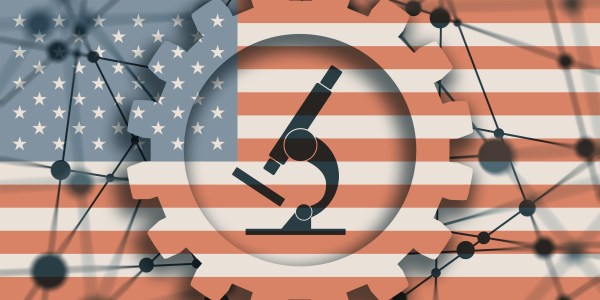Driven by the recent rise in hostility toward Big Tech companies, discussions of antitrust have moved from the esoteric pages of academic articles to the speeches of prominent politicians—on both sides of the aisle.
While liberals and conservatives have different complaints about the business practices of Facebook, Apple, Google, Amazon, and others, they are trying to use the same tool to address them: aggressive antitrust enforcement. Just this week, Missouri Sen. Josh Hawley announced two antitrust reform bills that, if enacted, would be far more radical than anything we have seen from the left.
Together, Hawley’s bills would completely prohibit mergers and acquisitions by large businesses and prevent companies like Amazon that offer a mix of third-party products and house brands from selling their own products on their own platforms. More important, his proposals would replace the consumer welfare standard—an approach designed to protect consumers based around price, quality, and innovation—-with one that focuses on the “protection of competition.” These proposals would discard decades of carefully considered antitrust policy in favor of a populist approach designed to harm large businesses regardless of their impact on consumers. This kind of “big is inherently bad” mentality is certainly dangerous, but unfortunately it is not new.
In the early 20th century, antitrust was an aggressive tool used for a variety of different and often conflicting goals. Unsubstantiated assumptions about market structure ruled the day, and clear-cut rules prohibited broad swaths of business practices that actually benefited consumers. Take pricing. During this era, pricing below a certain level was often viewed as anti-competitive, even though, as we now know, actual predatory pricing strategies are rare and vigorous price competition is what makes products more affordable and accessible for consumers.
This early 20th century antitrust regime provided a hostile environment where the government considered many business practices, like most mergers and acquisitions, illegal without regard to if consumers were actually harmed. In fact, Justice Potter Stewart once said that until that point, the “sole consistency” in antitrust merger cases was that “the Government always wins.” The result stunted economic growth, punished entrepreneurialism, and often harmed rather than helped consumers.
This changed in the 1970s when a group of prominent legal scholars sought to reign in antitrust law and root it in an appreciation for the harms that can come with overzealous enforcement. Driven by advocates and scholars on all sides, but primarily by right-of-center economists and lawyers, the consumer welfare standard became the widely accepted lodestar of antitrust analysis.
But now, a group of prominent progressives threaten the bipartisan consensus supporting the consumer welfare standard.
These “Neo-Brandeisian” (or “Hipster”) antitrust advocates call for a return to the early days of aggressive antitrust when the law worked toward a variety of different, vague, and often ill-defined ends. And they have been remarkably successful. Progressive politicians like Sen. Elizabeth Warren, Bernie Sanders, Chuck Schumer, and Amy Klobuchar have all expressed support for the reinvigoration of antitrust populism. Klobuchar recently introduced the Competition and Antitrust Law Enforcement Reform Act, which includes language about using antitrust enforcement to go beyond protecting consumers to advance socially progressive policies such as fighting income inequality and helping “historically disadvantaged communities.” Still, her bill is mild compared to Hawley’s recent proposal.
Klobuchar’s approach would shift the legal presumption for mergers by large businesses, while Hawley’s would prohibit them entirely. Even Klobuchar did not call for overturning the consumer welfare standard. Hawley did.
Whether branded as “conservative” or “progressive”, the results would be the same—less innovation, more regulation, hindered economic growth, and an approach to antitrust that casts aside consumers in favor of whatever political value is popular at the time.
Proposals that prohibit or severely restrict mergers by the largest players would actually harm the very small businesses they are designed to protect. Being acquired by a bigger company is one of the best ways for struggling entrepreneurs to recoup some of their losses and keep their business afloat. Given the impact COVID has had on small businesses, losing an avenue to investment would be devastating.
These concerns are some of the principal reasons why conservatives have historically been the loudest defenders of our more humble approach to antitrust. At its heart, conservatism is about limited government, individual rights, and free enterprise. But it may not be for long.
Hawley and his ilk have cast aside those ideals in their quest to make the Republican Party more populist, and their movement is quickly gaining traction. Several Republican-led states have sued the digital platforms and some right-wing pundits are echoing Hawley’s nationalistic rhetoric and calls for more aggressive antitrust enforcement.
But conservatives must resist the siren’s call of populist antitrust reform. We’ve tried it before, and the results won’t be any better the second time around.
Trace Mitchell is policy counsel at NetChoice, a trade organization.






Please note that we at The Dispatch hold ourselves, our work, and our commenters to a higher standard than other places on the internet. We welcome comments that foster genuine debate or discussion—including comments critical of us or our work—but responses that include ad hominem attacks on fellow Dispatch members or are intended to stoke fear and anger may be moderated.
With your membership, you only have the ability to comment on The Morning Dispatch articles. Consider upgrading to join the conversation everywhere.